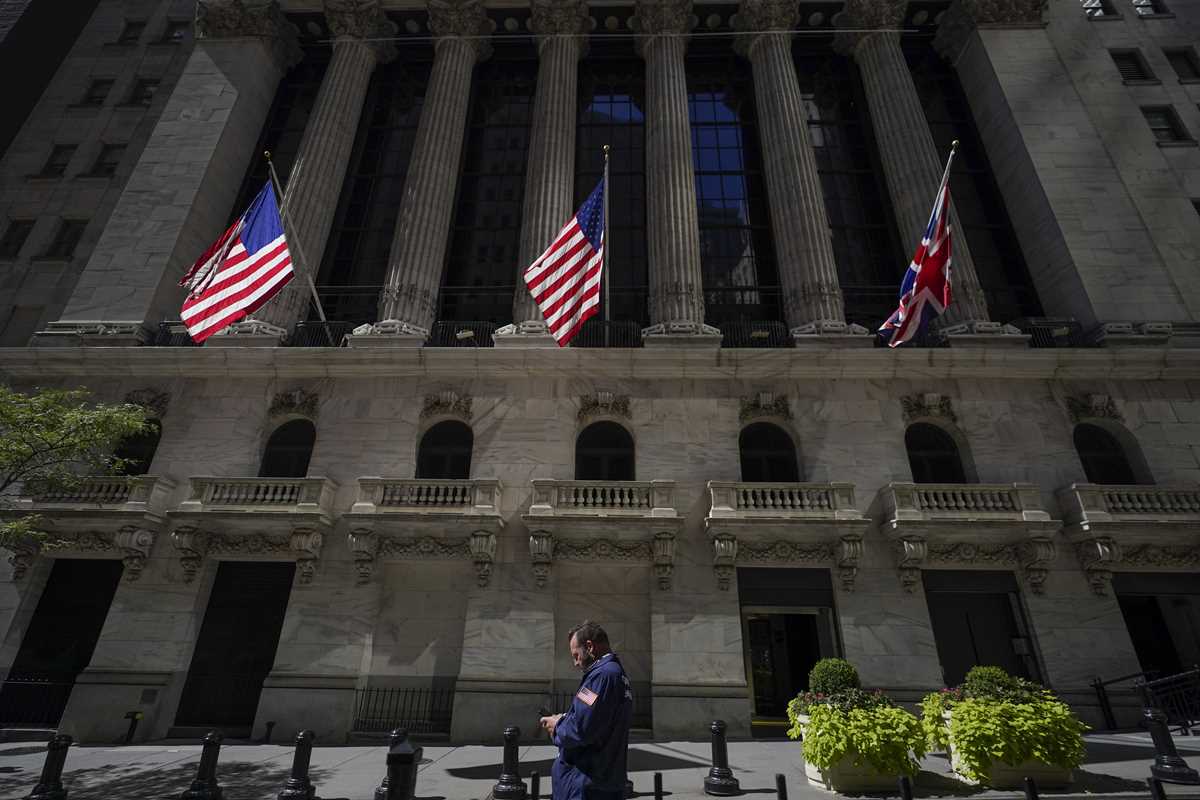 A trader looks over his cell phone outside the New York Stock Exchange, Wednesday, Sept. 14, 2022, in the financial district of Manhattan in New York. (AP Photo/Mary Altaffer, File)
A trader looks over his cell phone outside the New York Stock Exchange, Wednesday, Sept. 14, 2022, in the financial district of Manhattan in New York. (AP Photo/Mary Altaffer, File)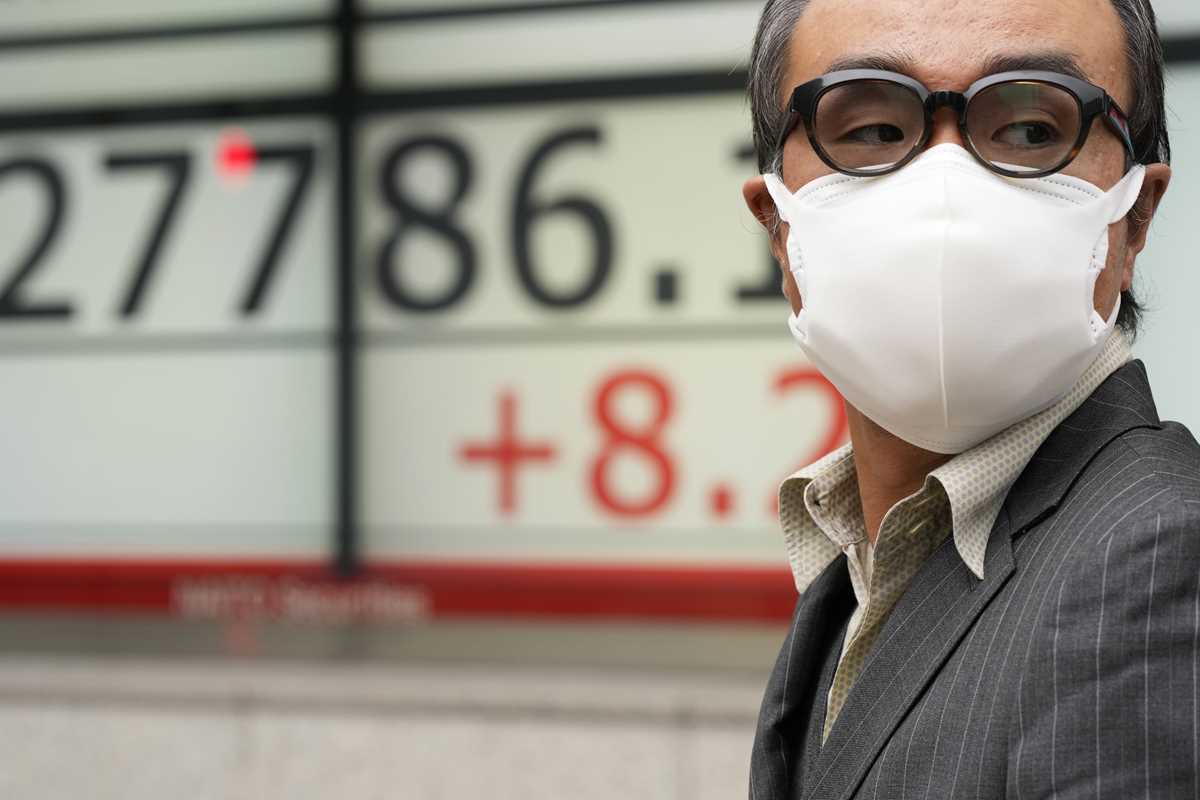 A man waits for a traffic light to change, standing near monitors showing Japan's Nikkei 225 index at a securities firm in Tokyo, Monday, Dec. 5, 2022. Asian shares were mostly higher and oil prices rose Monday after the European Union and the Group of Seven agreed on a boycott of most Russian oil and a price cap of $60 per barrel on Russian exports.(AP Photo/Hiro Komae)
A man waits for a traffic light to change, standing near monitors showing Japan's Nikkei 225 index at a securities firm in Tokyo, Monday, Dec. 5, 2022. Asian shares were mostly higher and oil prices rose Monday after the European Union and the Group of Seven agreed on a boycott of most Russian oil and a price cap of $60 per barrel on Russian exports.(AP Photo/Hiro Komae)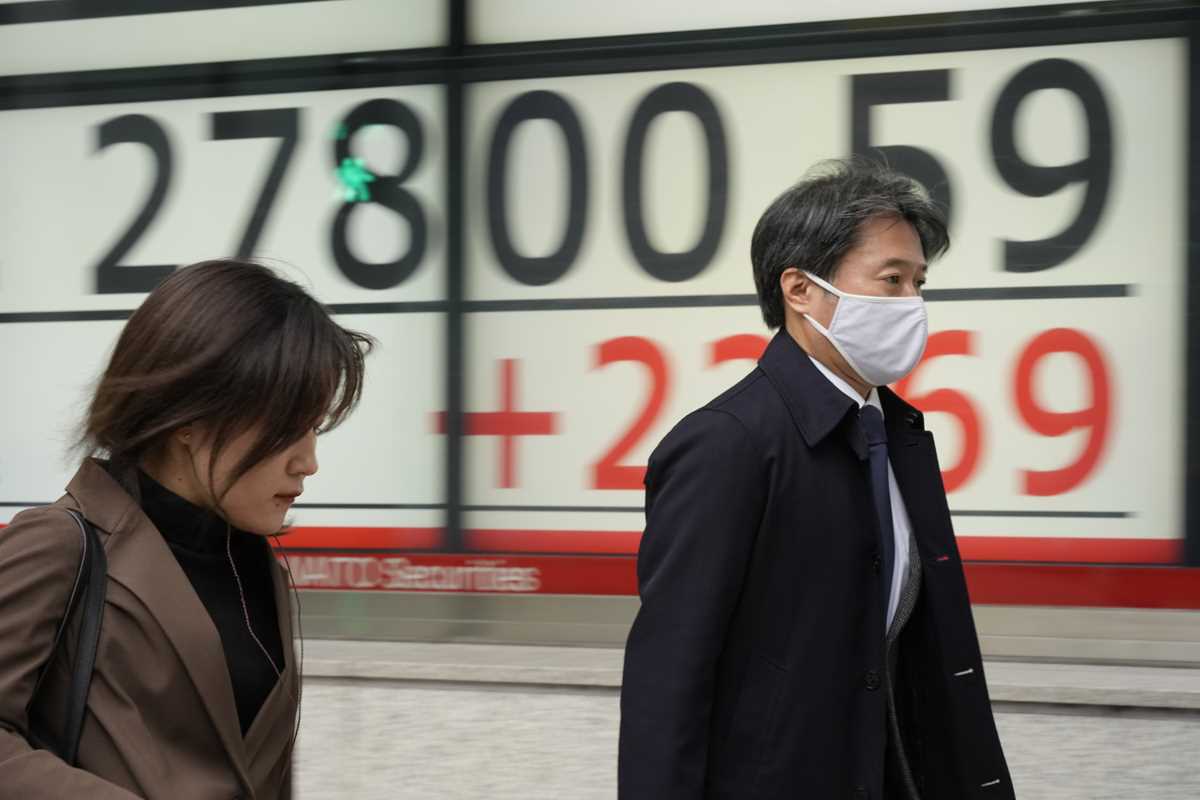 People walk by monitors showing Japan's Nikkei 225 index at a securities firm in Tokyo, Monday, Dec. 5, 2022. Asian shares were mostly higher and oil prices rose Monday after the European Union and the Group of Seven agreed on a boycott of most Russian oil and a price cap of $60 per barrel on Russian exports.(AP Photo/Hiro Komae)
People walk by monitors showing Japan's Nikkei 225 index at a securities firm in Tokyo, Monday, Dec. 5, 2022. Asian shares were mostly higher and oil prices rose Monday after the European Union and the Group of Seven agreed on a boycott of most Russian oil and a price cap of $60 per barrel on Russian exports.(AP Photo/Hiro Komae)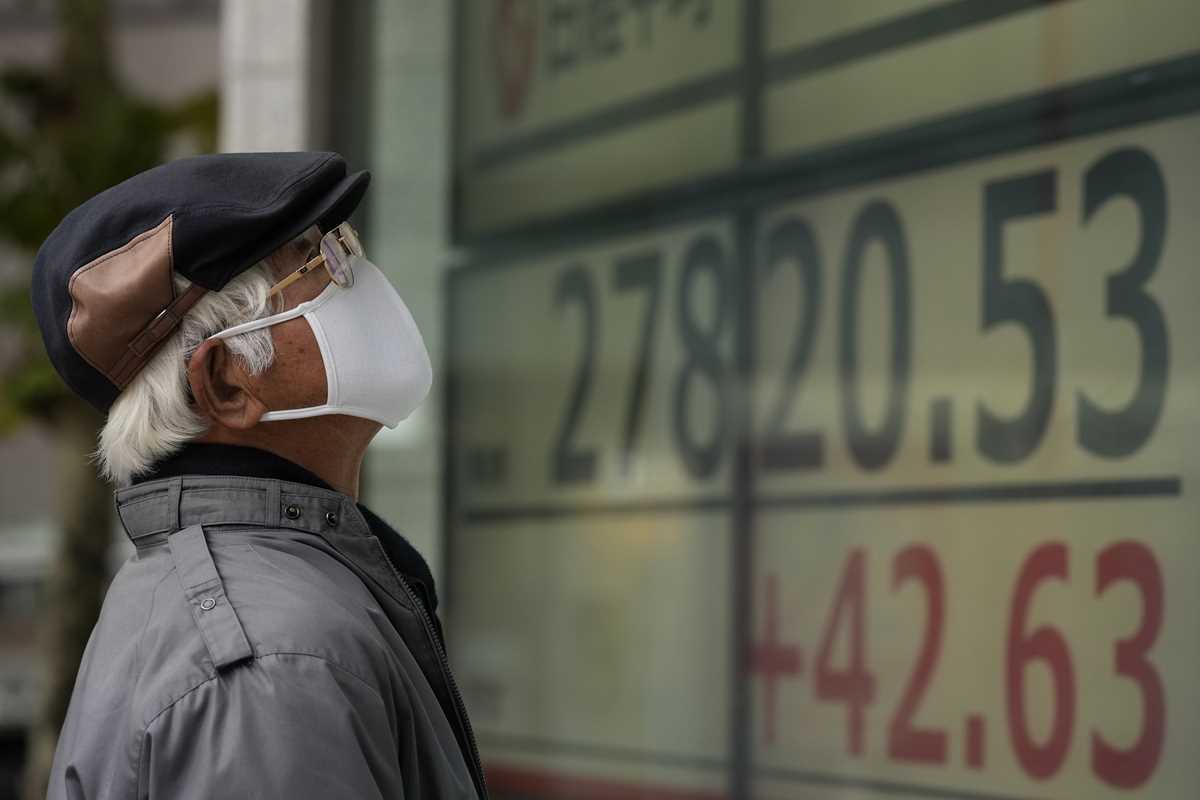 A man looks at monitors showing Japan's Nikkei 225 index at a securities firm in Tokyo, Monday, Dec. 5, 2022. Asian shares were mostly higher and oil prices rose Monday after the European Union and the Group of Seven agreed on a boycott of most Russian oil and a price cap of $60 per barrel on Russian exports. (AP Photo/Hiro Komae)
A man looks at monitors showing Japan's Nikkei 225 index at a securities firm in Tokyo, Monday, Dec. 5, 2022. Asian shares were mostly higher and oil prices rose Monday after the European Union and the Group of Seven agreed on a boycott of most Russian oil and a price cap of $60 per barrel on Russian exports. (AP Photo/Hiro Komae)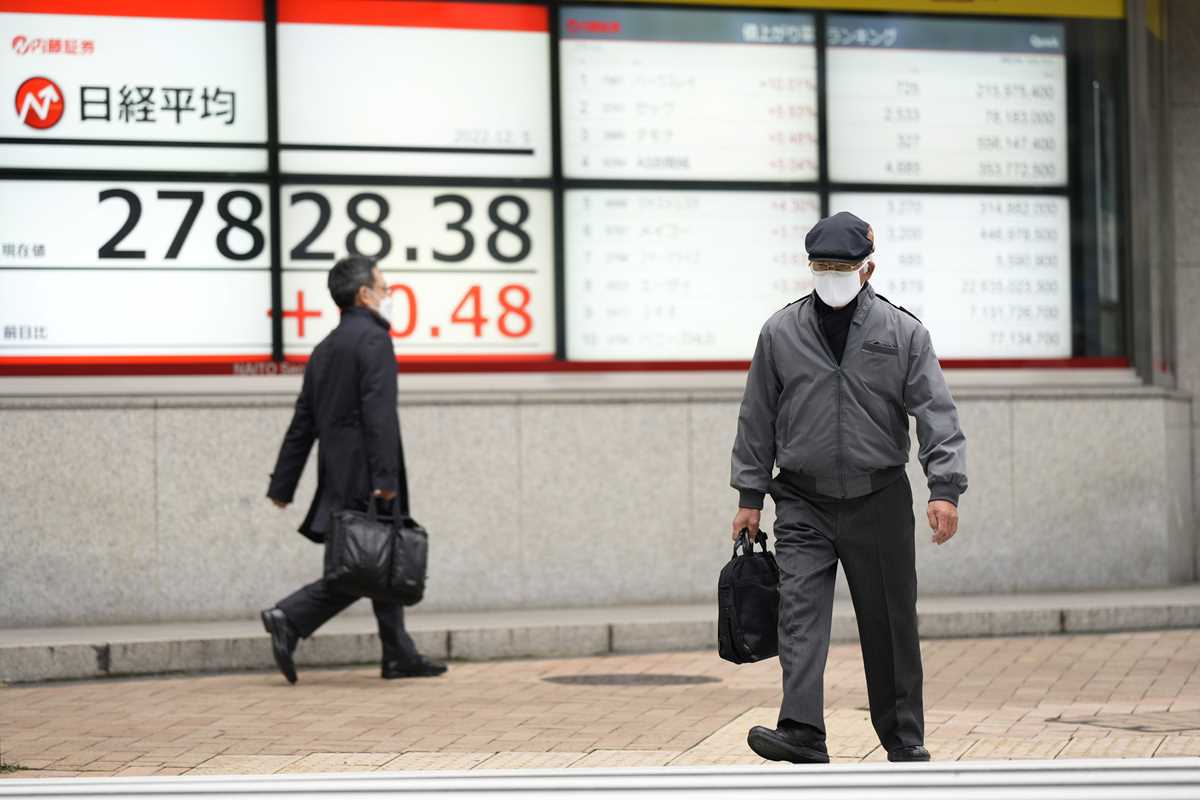 People walk by monitors showing Japan's Nikkei 225 index at a securities firm in Tokyo, Monday, Dec. 5, 2022. Asian shares were mostly higher and oil prices rose Monday after the European Union and the Group of Seven agreed on a boycott of most Russian oil and a price cap of $60 per barrel on Russian exports. (AP Photo/Hiro Komae)
People walk by monitors showing Japan's Nikkei 225 index at a securities firm in Tokyo, Monday, Dec. 5, 2022. Asian shares were mostly higher and oil prices rose Monday after the European Union and the Group of Seven agreed on a boycott of most Russian oil and a price cap of $60 per barrel on Russian exports. (AP Photo/Hiro Komae)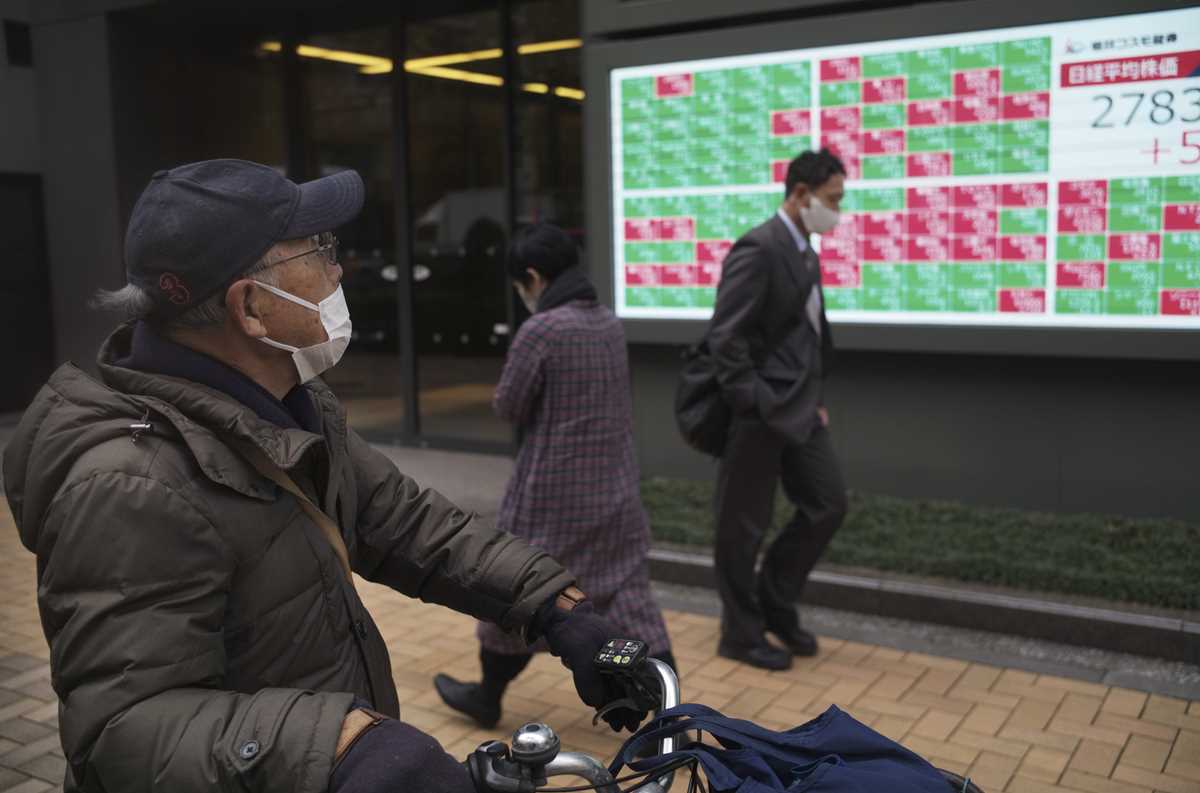 A man looks at monitors showing Japan's Nikkei 225 index at a securities firm in Tokyo, Monday, Dec. 5, 2022. Asian shares were mostly higher and oil prices rose Monday after the European Union and the Group of Seven agreed on a boycott of most Russian oil and a price cap of $60 per barrel on Russian exports.(AP Photo/Hiro Komae)
A man looks at monitors showing Japan's Nikkei 225 index at a securities firm in Tokyo, Monday, Dec. 5, 2022. Asian shares were mostly higher and oil prices rose Monday after the European Union and the Group of Seven agreed on a boycott of most Russian oil and a price cap of $60 per barrel on Russian exports.(AP Photo/Hiro Komae)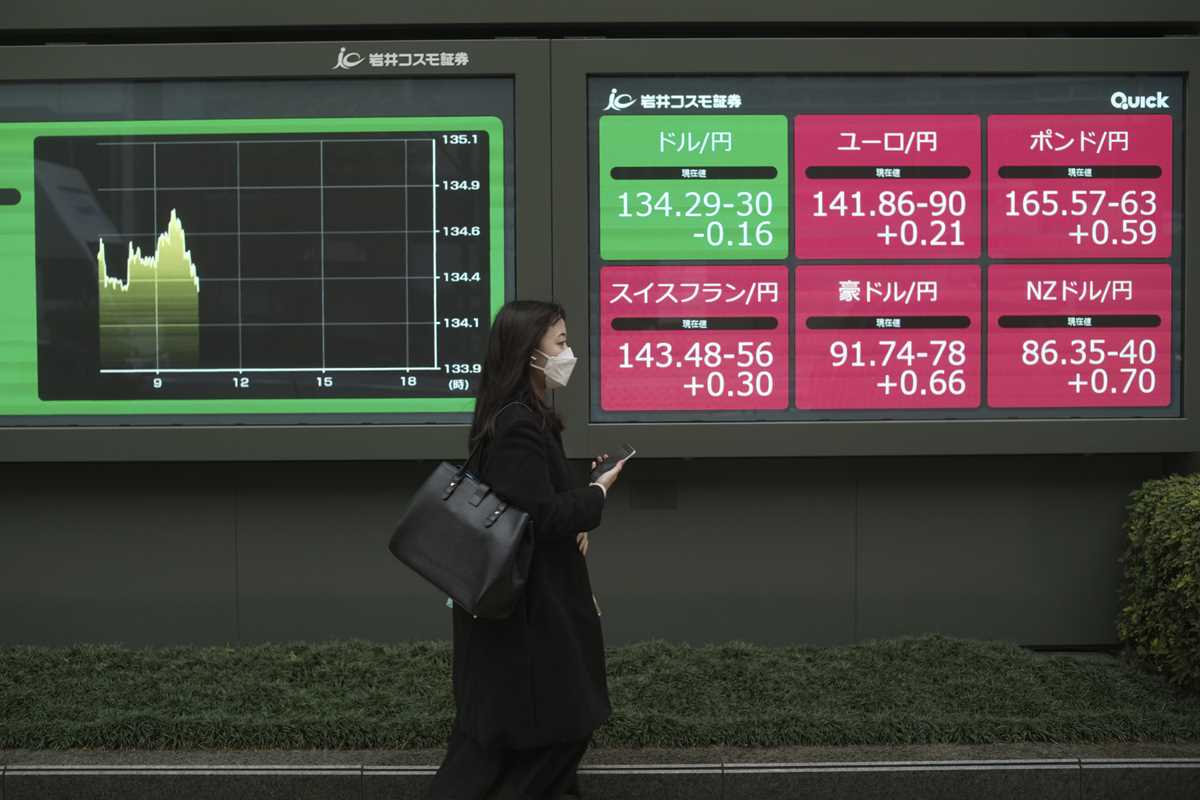 A woman walks by monitors showing exchange rates of the Japanese yen against foreign currencies at a securities firm in Tokyo, Monday, Dec. 5, 2022. Asian shares were mostly higher and oil prices rose Monday after the European Union and the Group of Seven agreed on a boycott of most Russian oil and a price cap of $60 per barrel on Russian exports.(AP Photo/Hiro Komae)
A woman walks by monitors showing exchange rates of the Japanese yen against foreign currencies at a securities firm in Tokyo, Monday, Dec. 5, 2022. Asian shares were mostly higher and oil prices rose Monday after the European Union and the Group of Seven agreed on a boycott of most Russian oil and a price cap of $60 per barrel on Russian exports.(AP Photo/Hiro Komae)U.S. futures dipped and oil prices rose Monday after the European Union and the Group of Seven democracies agreed on a boycott of most Russian oil and committed to a price cap of $60 per barrel on Russian exports.
Futures for the Dow Jones Industrials and the S&P 500 were each down about 0.4% before the bell.
It is unclear how much Russian oil the two sanctions measures might remove from the global market, tightening supply and driving up prices. The world’s No. 2 oil producer has been able to reroute much, but not all, of its former European shipments to customers in India, China and Turkey.
On Sunday, the OPEC+ alliance of oil producers, including Russia, maintained their targets for shipping oil to the global economy. In October, the alliance opted to slash production by 2 million barrels per day starting in November, raising tensions with the U.S. and Western allies.
U.S. benchmark crude oil rose $2.17 to $82.15 per barrel in electronic trading on the New York Mercantile Exchange. It lost $1.24 to $79.98 per barrel on Friday.
Brent crude added $2.27 to $87.84 per barrel after Western countries on Monday began imposing the $60-per-barrel price cap and ban on some types of Russian oil.
Prices, however, have tumbled since March when a barrel of both U.S. and Brent crude soared above $130 per barrel.
In Asian trading, Hong Kong’s benchmark jumped 4.5% to 19,518.29. The Shanghai Composite added 1.8% to 3,211.81.
There is hope that disruptions to manufacturing and trade will abate as Chinese authorities lift some of the most onerous restrictions imposed to contain outbreaks of the coronavirus, while saying their “zero-COVID” strategy — which aims to isolate every infected person — is still in place. The curbs have included lockdowns of neighborhoods or buildings, frequent mandatory testing and shutdowns of factories and other businesses.
There were several days of protests across cities including Shanghai and Beijing as public frustration with the COVID-19 curbs boiled into unrest. Some demanded Chinese President Xi Jinping step down in an extraordinary show of public dissent in a society over which the ruling Communist Party exercises near total control.
Tokyo's Nikkei 225 climbed 0.2% to 27,820.40 and the Kospi in Seoul shed 0.6% to 2,419.32. In Sydney, the S&P/ASX 200 advanced 0.3% to 7,325.60. Shares fell in Mumbai but rose in Singapore and Taiwan. Thailand's markets were closed for a holiday.
Germany’s DAX and the CAC 40 in Paris each lost 0.6%, while Britain’s FTSE 100 edged 0.2% higher.
Shares were mixed Friday after new data showed U.S. wages were accelerating despite aggressive tactics by the Fed to cool them, and the economy, in its bid to rein in inflation. That data raised the odds that the Fed will maintain its rate trajectory, which could risk tipping the country into recession.
The S&P 500 edged 0.1% lower and the Dow industrials gained 0.1%. The Nasdaq composite fell 0.2%.
Stocks have been on the upswing for the last month on hopes inflation may have peaked, allowing the Federal Reserve to dial down rate hikes that aim to undercut inflation by slowing the economy and dragging down prices for stocks and other investments.
But Friday’s labor market report showed that wages for workers rose 5.1% last month from a year earlier. That’s an acceleration from October’s 4.9% gain and easily topped economists’ expectations for a slowdown.
U.S. employers added 263,000 jobs last month. That beat economists’ forecasts for 200,000, while the unemployment rate held steady at 3.7%. Many Americans also continue to stay entirely out of the job market, with a larger percentage of people either not working or looking for work than before the pandemic, which could increase the pressure on employers to raise wages.
Still, a growing number of economists are forecasting the U.S. economy will dip into a recession next year, mainly because of higher interest rates.
In currency dealings, the dollar gained to 135.27 Japanese yen from 134.39 yen late Friday. The euro rose to $1.0563 from $1.0540.
——
Kurtenbach reported from Bangkok; Ott reported from Washington.
Before you make your next trade, you'll want to hear this.
MarketBeat keeps track of Wall Street's top-rated and best performing research analysts and the stocks they recommend to their clients on a daily basis.
Our team has identified the five stocks that top analysts are quietly whispering to their clients to buy now before the broader market catches on... and none of the big name stocks were on the list.
They believe these five stocks are the five best companies for investors to buy now...
See The Five Stocks Here
Which stocks are major institutional investors including hedge funds and endowments buying in today's market? Click the link below and we'll send you MarketBeat's list of thirteen stocks that institutional investors are buying up as quickly as they can.
Get This Free Report